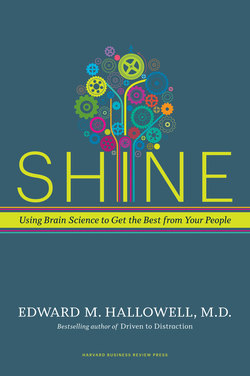Читать книгу Shine - Ned Hallowell - Страница 12
На сайте Литреса книга снята с продажи.
Why These Ideas Matter Now
ОглавлениеA while ago our world exploded. The environment and the world of towns and cities and families and communities blew apart, along with the world of ideas and information, of entertainment and communication, of politics and diplomacy, and of course the world of businesses and organizations. It’s hard to date when the explosion started, but it was after JFK’s assassination and before 9/11. Somewhere in there the modern big bang began. And it’s still banging.
Living well in the midst of an ongoing explosion takes work, patience, skill, and luck. Managing well in the midst of an explosion may seem to require superhuman powers. Managers today may feel like the prophets in the Old Testament who asked, “Why me, Lord?”
You have your own answers to that question, such as: the challenge, the mission, the paycheck, the adventure, the calling, the necessity, or just the feeling that if you don’t do it, nobody else will. So each day, you jump into the explosion. You do all you can to make sense out of chaos and keep your organization, your mission, and your people moving forward. You draw upon values and lessons you learned growing up, like “never say die,” “give it your all,” and “look for the best in people.” When all else fails you fall back upon your core self—who you are, what you do when no one else is looking.
You can lose your bearings easily. As a manager, you can feel like the blind leading the blind. How are you supposed to know what to do when no one has a clue what will happen tomorrow? How do you reassure and lead people when you are scared as hell, at least in those rare moments when you have time to stop and think about what’s really going on? What do you do about it? Shoot from the hip and hope for the best? Learn to love the smell of napalm in the morning?
Of course not. But the explosion that surrounds us makes managing people extremely dicey, to put it mildly. That’s why I feel an urgency in offering the plan in this book. I want to give you a mooring you can hold on to and use as the storm gets wild. I want to give you a connection you can use.
A key to working my Cycle of Excellence is making the critical step of connection. When that is threatened, all the other steps go awry. Unless managers realize how crucial it is to create an emotionally stable, connected environment in the midst of the maelstrom of modern business life, they will—and do—sacrifice performance in the name of speed, cost cutting, efficiency, and what they perceive to be necessity. In such a context, deep thought disappears, only to be replaced by decisions based on fear. Frazzled becomes the order of the day.
As global competition and economic stress create problems for businesses of all kinds everywhere, managers who don’t have a plan to stabilize operations will be compelled to revert to crisis mode, putting out fires all day, just hoping to survive. The managers who do best develop a method that enables their people to do their work without toxic stress. Most of the time, such plans and methods languish in a book on the shelf, and never get put into action. The method that actually gets used is some simple version of the carrot-and-stick approach: do this and you’ll get that. Work hard—or else.
The “or else” seems to grow more ominous every day. Week after week, we read about one corporate calamity or another; one dire economic prediction after another; one reason after another to be afraid, very afraid. As the pinch grows tighter, the methods managers use grow more primitive. Fear rules. Management by fear, if not panic, becomes the mainstay of all but the most enlightened managers. And what do those enlightened managers know that others overlook? They know that fear disables the mind just as surely as lack of oxygen.
My plan offers an alternative to panic or serial crisis management. You will learn a method you can set in motion anywhere to bring out the best in any person, no matter what is going on in the wider world. I will also point out what to do when things break down. When a person is not performing at his or her best, it usually stems from a problem in one of the five steps in the Cycle of Excellence, most often steps 1, 2, or 3: select, connect, or play. I will show you how to identify those problems and how to correct them.
Once you understand the Cycle of Excellence as well as the ways it can break down, you will have a more effective plan for bringing out the best in your people than simply wielding the fear of job loss or exhorting them to try harder. You will be able to creatively manage for growth, rather than manage for mere survival. You will know how to capture the positive energy in the explosion surrounding us today and not let it blow you and your organization away.
